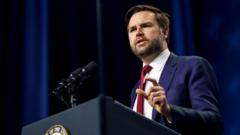Friedrich Merz, poised to lead Germany, must contend with low popularity and economic stagnation while confronting international challenges, particularly from President Trump. His willingness to take risks may be crucial in shaping Europe's future amidst rising uncertainties.
Friedrich Merz's Chaotic Path to Chancellor: Challenges and Opportunities Ahead

Friedrich Merz's Chaotic Path to Chancellor: Challenges and Opportunities Ahead
Germany's next chancellor faces a daunting landscape amid widespread discontent and economic woes. Can his bold style navigate these turbulent waters?
In Berlin, uncertainty looms over Friedrich Merz as he prepares to assume the chancellorship of Germany following a parliamentary election fraught with mixed feelings. Though he's garnered the right to form a government, his support base is thin; many Germans remain skeptical about his leadership abilities, with his personal appeal questioned even among party supporters.
Yet, this critical moment presents Merz with a unique opportunity to influence Europe more significantly than any of his predecessors since the Merkel era. Two pivotal factors shape this chance: the first is his emerging dynamic with President Trump, whose military threats and unilateral approach to negotiations with Russia serve to position Merz as a stabilizing force for Europe. The second is Merz’s unapologetically bold style, which, while occasionally pushing away allies, has nonetheless propelled him to this momentous role.
As he steps into office, the immediate focus will be on addressing the anxieties of a nation grappling with stagnant economic growth and high living costs. Public sentiment bears a heavy weight on the chancellor-to-be, especially regarding the contentious issue of migration from the Middle East. The electorate’s call for dramatic change resonates strongly, leaving Merz with high expectations to fulfill.
Survey responses from the polls indicate that voters are anxious about the economic direction and the societal divisions stemming from migration policies. As he takes on this formidable mantle, the question remains whether Merz can effectively balance the internal pressures of his populace with the external challenges on the European stage, particularly with Trump’s unpredictable maneuvers.
This inaugural chapter of Merz's chancellorship could not only make or break his political legacy but also redefine Germany’s role in Europe, setting the tone for future relations across the continent.
Yet, this critical moment presents Merz with a unique opportunity to influence Europe more significantly than any of his predecessors since the Merkel era. Two pivotal factors shape this chance: the first is his emerging dynamic with President Trump, whose military threats and unilateral approach to negotiations with Russia serve to position Merz as a stabilizing force for Europe. The second is Merz’s unapologetically bold style, which, while occasionally pushing away allies, has nonetheless propelled him to this momentous role.
As he steps into office, the immediate focus will be on addressing the anxieties of a nation grappling with stagnant economic growth and high living costs. Public sentiment bears a heavy weight on the chancellor-to-be, especially regarding the contentious issue of migration from the Middle East. The electorate’s call for dramatic change resonates strongly, leaving Merz with high expectations to fulfill.
Survey responses from the polls indicate that voters are anxious about the economic direction and the societal divisions stemming from migration policies. As he takes on this formidable mantle, the question remains whether Merz can effectively balance the internal pressures of his populace with the external challenges on the European stage, particularly with Trump’s unpredictable maneuvers.
This inaugural chapter of Merz's chancellorship could not only make or break his political legacy but also redefine Germany’s role in Europe, setting the tone for future relations across the continent.





















